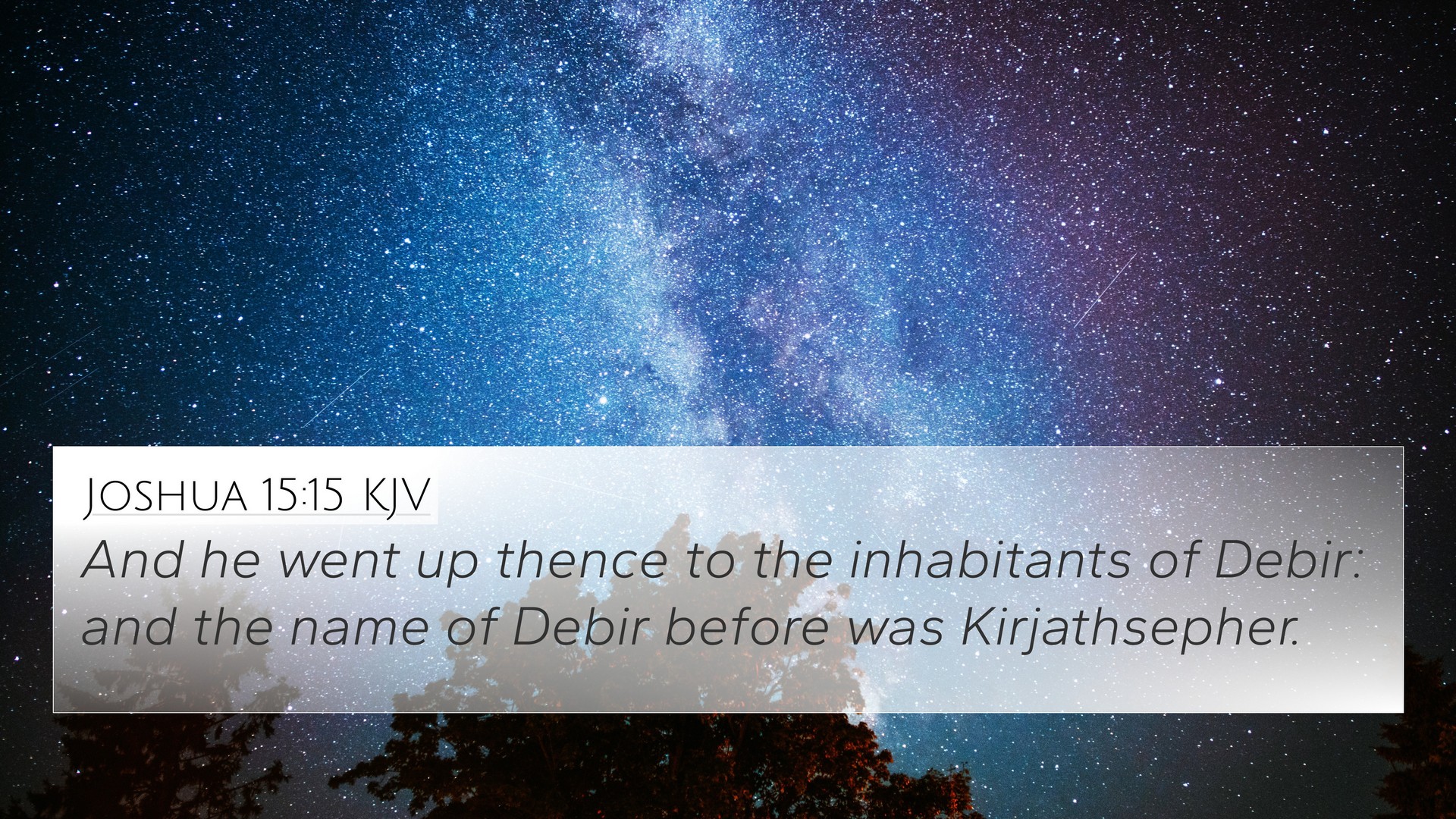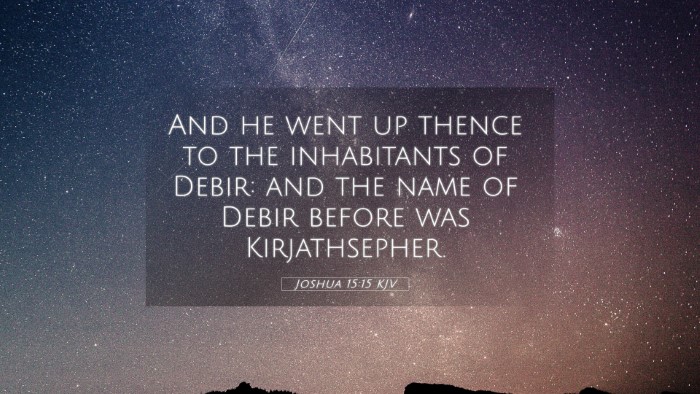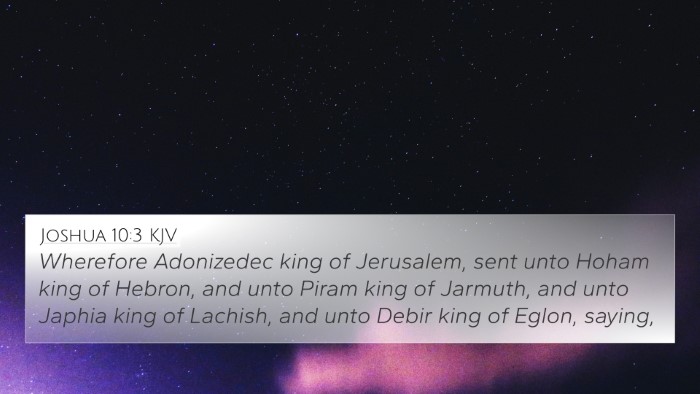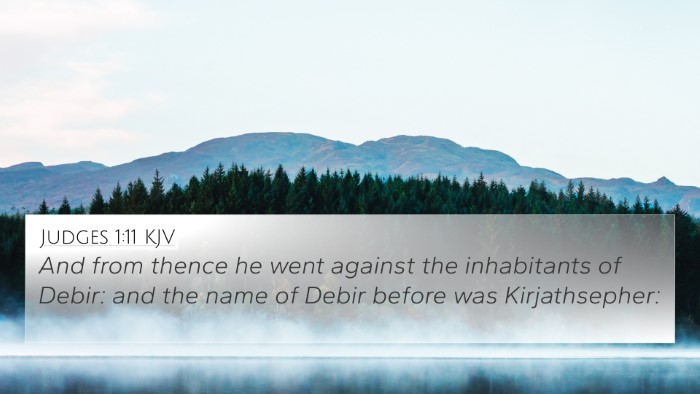Meaning and Interpretation of Joshua 15:15
Verse Context: Joshua 15:15 states, "And he went up thence to the inhabitants of Debir: and the name of Debir before was Kirjathsepher." This verse occurs in the context of the division of the land among the tribes of Israel, specifically focusing on the territory of Judah.
Summary of Insights from Commentaries
The commentaries by Matthew Henry, Albert Barnes, and Adam Clarke offer valuable insights into this verse's meaning and its implications within the broader narrative of the Bible.
Key Insights:
-
Historical Significance:
Henry notes the historical significance of Jerusalem and its surrounding regions in Israel's conquest. The mention of Debir and its previous name, Kirjathsepher, highlights the shifting power dynamics as Israel begins to possess the land promised to them.
-
Symbolic Meaning:
Albert Barnes interprets the change of name from Kirjathsepher to Debir as emblematic of the deep-rooted changes in the lives of the Israelites as they establish their own identity in the land. Names in the Bible often symbolize character or destiny.
-
Geographical Context:
Clarke emphasizes the geographical context, explaining that Debir is situated in the hill country of Judah and represents a strategic point during the Israelite conquest. Understanding the layout of these regions sheds light on Israel's military campaigns.
-
Military Strategy:
Henry points out the military aspect of this passage, suggesting that Joshua’s advances into Debir demonstrate Israel's determination to secure all the territories designated to them by God.
-
Covenant Fulfillment:
All three commentaries highlight that this verse is part of God’s promise to Abraham, Isaac, and Jacob, showing the fulfillment of God's covenant with His people. The conquest signifies God's faithfulness to His covenant promises.
Bible Cross-References:
This verse connects various themes and narratives within Scripture. Here are some notable Bible cross-references:
- Joshua 1:3: "Every place that the sole of your foot will tread upon I have given to you, just as I promised to Moses." - Highlights the divine promise of land.
- Joshua 10:39: "And he took it, and the king thereof, and all the cities thereof; and he utterly destroyed them, as he had done to Hebron." - Continues the narrative of conquest.
- Judges 1:11: "And from thence he went against the inhabitants of Debir: and the name of Debir before was Kirjathsepher." - A direct reference that links the narrative in Judges back to Joshua.
- Genesis 15:18: "On that day the Lord made a covenant with Abram, saying, 'To your offspring I give this land...'" - Reiterates the importance of the land promise.
- Exodus 23:31: "And I will set your borders from the Red Sea to the sea of the Philistines, and from the wilderness to the river..." - A promise of territory given to Israel.
- Hebrews 11:30: "By faith the walls of Jericho fell down, after they were compassed about seven days." - Reflects on the faith of the Israelites during their conquest.
- Luke 1:72-73: "To perform the mercy promised to our fathers, and to remember his holy covenant." - Connects New Testament fulfillments to Old Testament promises.
- Romans 4:13: "For the promise to Abraham and his offspring that he would be heir of the world did not come through the law but through the righteousness of faith." - Establishes a link with the Abrahamic covenant.
- Deuteronomy 1:8: "See, I have set the land before you. Go in and take possession of the land..." - Calling Israel to claim the promised land.
- Psalm 37:29: "The righteous shall inherit the land, and dwell therein forever." - Reinforces the theological theme of land ownership in biblical faith.
Thematic Connections Across Scripture
This verse is pivotal in understanding the connections between various Bible verses and the overarching narrative of God’s covenant with Israel. It highlights the importance of:
-
God’s Promises:
This theme appears throughout Scripture, consistently linking the Israelites' actions with the fulfillment of God's promises, as seen in the references to both Old and New Testament scriptures.
-
Covenant Identity:
The identity of Israel as God's chosen people carries through these narratives. The land is not just a physical possession but a spiritual inheritance.
-
Faith and Obedience:
The narrative emphasizes the role of faith in accessing God's promises; Israel’s obedience directly relates to their success in taking the land.
Conclusion
Understanding Joshua 15:15 through these commentaries and cross-references illustrates the richness of biblical texts and their interconnections. Such analysis not only provides insights into individual verses but also highlights the broader theological themes that resonate throughout the Scriptures.
By utilizing tools for Bible cross-referencing and engaging in comprehensive studies, readers can deepen their understanding of how different passages relate to and reinforce each other, enriching their biblical studies and spiritual growth.





